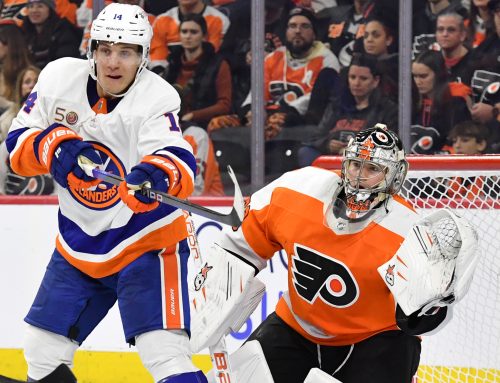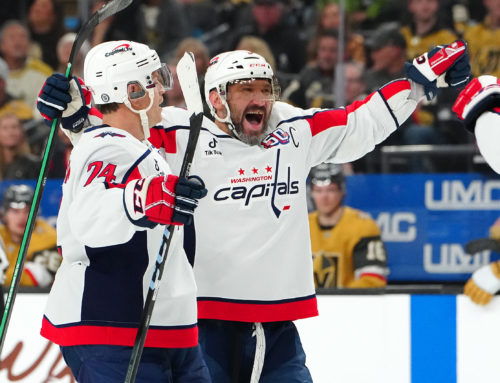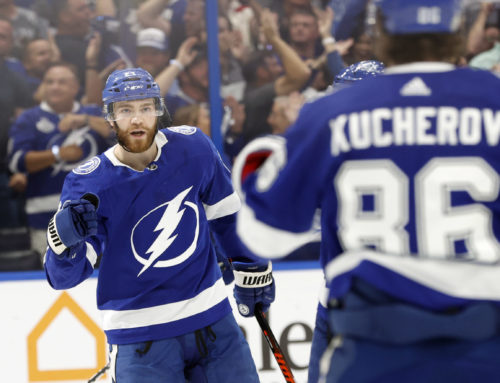Ramblings: Pre-Season Checklist – Research, Management & Preparation (Sept 28)
Alexander MacLean
2022-09-28
If you're reading this then odds are that you're in at least one fantasy hockey league, and you're now really ramping up for the NHL season. What that means differs from person to person. Maybe it means you're re-ranking your top-500 draft options for the 4,762nd time, or maybe it means you're printing off last year's top-30 skaters so you can circle some names with your HP#2 and that's the extent of your research.
Regardless of how you approach things, there's a regular checklist of things to do before the season begins in just over a week. In order for you not to forget anything, let's run through that all now.
*
Joining a League
This is the easiest part, and whether it's year #30 of the pick'em pool with your office friends, or it it's year #1 of a full-on dynasty, the excitement is the same. The difference though lies in the expectations v. reality that will crop up as the season rolls on, and to save yourself a lot of disappointment and stress, take a second to consider a few general facts first:
-Is there a good group of managers in the league? A good group makes it fun, as it's supposed to be – a bad group can be a mood-killer, but you stay anyways because you're already invested. Save yourself the hassle and keep things to well-vetted leagues or friend-groups.
-Play within your limits. This can account for either an entrance/prize-pot fee, or it can just mean the time you are investing. Both are valuable, and fantasy sports can easily milk a lot more than you have to give. I had one year where I was commissioner for three daily lineup leagues, played in 10 others, and had four other weekly/limited moves leagues running. I made it through, but I cut the number of leagues in half the next two summers, as it wasn't sustainable, despite the enjoyment factor.
*
Being a Commissioner
One of the most thankless roles, not just in fantasy sports, but anywhere, is the role of the fantasy-sport commissioner. It's completely volunteer, you're supposed to be both competitive and impartial, and you have to deal with wounded pride year-round. The best thing you can do is make sure you have a good group of GMs, a clear set of rules that covers all necessary angles, and a fun setup.
The good group of GMs and the fun setup are pretty straightforward and easier to manage, but there are some general tips on league management that I still don't see followed very much:
-Make sure your trade veto process is clear, fair, and ideally more hands-off than hands-on. The majority of league disputes come from trades and trade vetos. If you have a good group of GMs, then the issue of collusion comes up less, but there will still be bad deals. They're a touchy subject, and it varies depending on setup, and the manager group, but I have found the best leagues have hardly any vetos, and clear, impartial rules on how they would ever be undertaken.
-When it comes to making rule changes, unless an immediate patch-job is absolutely necessary, hold off on making changes until the summer. This allows GMs to account for any fluctuations in value, and doesn't case discrepancies in how the season unfolds. Nothing is more irritating to a manager than having to wonder what rules might be changed in-season, and having something planned that ends up being flipped on its head because the commissioner changed a rule on a whim.
*
Now that we have the startup and league management out of the way, we can get to the fun stuff. Really that gets broken down into three main categories: research, team management, and league chat.
Research
When it comes to doing research, most people think it starts and ends with a draft ranking. If that's all you're doing then I hope you're just in it for the fun. The first step, and perhaps the most important, is to understand your league settings.
What that means is knowing how each position is valued relative to each other, whether you need more volume or ratios, whether you can punt/stack categories or if you should be balancing your production, and if it's a keeper or cap league, how much of an eye you need to keep to the future and your finances. There is a lot that goes into it, but understanding your league settings, how they work, what the gameplay is like, what championship teams in that league have done in the past few years to find success, and where your league mates might be over- or under-valuing something can make a huge difference in the long run of the season.
Knowing what kind of setup you have shapes your initial approach and strategy to the season, which then alters your rankings, shifts you research focus, and causes your approach to vary in-season when you are ultimately forced to pivot.
There are tools easily accessible on the Dobber network such as the Fantasy Guide, the constantly-updated rankings lists, the Fantasy Hockey Geek site, Frozentools and all the wonderful gadgets they have to offer, and of course the Forums, which cover the main bases of everything you should need to plan for your season.
All of these things will help you with your strategy, your initial rankings, and draft management, which sets your team up with a solid foundation to build on for the rest of the season. The more you put in at the beginning, the exponentially better the return will be at the end of the year.
*
Management
Now, even if you don't do any research, you can still occasionally win a league. Or on the other hand, if you do a ton of research, have excellent planning, and execute that plan to perfection in your draft, your team can still fall flat on its face.
This is where the in-season management comes in. This can be anything from setting lineups regularly, picking the right players (and especially goalies) to start, covering for injuries, mining the waiver wire, making trades, and playing the schedule in your favour.
-When managing who to sit/start, you can jump to the forums, or for goalies check GoaliePost to get updates on who is actually playing and what the matchup looks like.
-When covering for injuries, take a look at how long the player is projected to be out for, and decide on a short-term or long-term patch job. A short-term solution would be plucking a player off the FA pile who is currently riding a hot-streak, or even grabbing the injured-player's immediate replacement in their NHL lineup, hoping for similar production. A longer-term play would likely involve making a trade to shore up your weak point by moving out a player from a deeper position. Again, the forums are usually a good spot to frequent for these kinds of decisions.
-Mining the waiver wire is often one of the most-discussed topics in the daily columns and ramblings on the site, and if you want to diversify (maybe everyone in your league is also reading the Dobber content) then there are dozens of other opinions out there that you can look into – the difficult part is sorting out who to trust.
-When looking ahead at the schedule and trying to get an edge, be it by streaming, trading for more man games, trying to match players that play on varying nights, or anything of that sort, there are lots of tools out there to help with it all. A whole section of the guide is devoted to the schedule, and there is a wonderful schedule planner tool on the FrozenTools site that can cover just about anything you need. There is also a fun extra tool that you can download over on the forums, as one of the long-time members puts together a handy excel sheet to help you minimize your conflicts between game nights of players on your fantasy teams.
*
League Chat
There isn't much to this other than have fun, be a good person, lose and win graciously, pay your league fees, and talk up your players all the time because no one else will. Okay that's a fair bit, but it's all pretty straightforward, and you all know how to be good people already, right?
*
I hope that helps lay out the prep and constant work though the season for you. A lot of it is likely already known, but having it broken down and spelled out usually helps uncover a few spots where you can improve on your fantasy game.
For me, I think the biggest thing at the moment is making sure I don't overreact to training camp line combinations. For example, I have one cap league where I was going to have to move one of Conor Sheary, Antti Raanta, or Tyson Jost (replacing the player with Cal Foote from my farm) in order to fit under our salary cap. I probably could have waited for a better deal to come in, but I saw Sheary down on line four on the first day of camp, and immediately jumped on the first real offer I got for him. Every day since I made the trade, he has been skating back up on line two. At least it's not something that is going to make or break my year, but it's annoying to have fallen into the same trap again this year.
Stay sharp friends, and I know we're getting close, but be patient while we wait for NHL hockey to return.
*
You can find me on Twitter @alexdmaclean if you have any fantasy hockey questions or comments.
See you next Wednesday!




 WSH
WSH COL
COL CBJ
CBJ T.B
T.B OTT
OTT VGK
VGK DET
DET NYI
NYI BOS
BOS UTA
UTA N.J
N.J CAR
CAR STL
STL S.J
S.J CHI
CHI FLA
FLA CGY
CGY NYR
NYR EDM
EDM MIN
MIN DAL
DAL PHI
PHI
